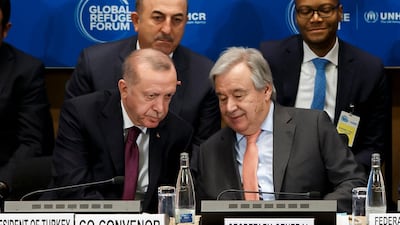Turkey's President Recep Tayyip Erdogan said one million Syrian refugees should be repatriated in "a very short period of time" despite international fears that the plan violates international law.
The Turkish leader accused the European Union of failing to fulfil its financial promises to support Syrians in his country.
He said more than 600,000 of the 3.7 million Syrian refugees living in Turkey should join nearly 400,000 people living in what he has termed the "peace zone" in northern Syria. The area was held by the Kurdish militia until October when the Turkish army invaded, driving the Kurds away.
"Nobody seems inclined to help us," Mr Erdogan told the Global Refugee Forum in Geneva on Tuesday.
"When we haven't received the support we needed from the international community, we had to take care of our own self."
Speaking at the forum, the UN's High Commissioner for Refugees Filippo Grandi called for a "broad alliance" of governments, businesses, development institutions and other groups to "reboot" the world's approach to handling refugees.
After launching the Global Compact for Migration last year, Mr Grandi wants to secure pledges of long-term assistance for those forced from their homelands.
"Our world is in turmoil and 25 million refugees are looking to us for solutions," Mr Grandi said.
"As a new decade dawns with some 71 million people uprooted from their homes globally, inside and outside their countries, it's time to reboot our responses," he added.
The Turkish president blamed a lack of international assistance to support the millions of refugees living in Turkey. He told the delegates Ankara had be forced to launch the invasion to clear the "terrorist presence" there.
Mr Erdogan said his country had spent around $4 billion (Dh 14.7 billion) hosting refugees and chastised the EU ask for assistance, we don't receive it," he said.
He also criticised some European countries for using methods to keep refugees off their land, including erecting barbed wire fences.
"We need to find a formula that will allow the refugees to remain in their homelands and the ones who have already travelled to Turkey to be peacefully returned and resettled in their homelands," he added.
Mr Erdogan said that housing and schools should be set up in the zone, which would allow thousands more refugees to rejoin the 371,000 who have already returned, "on a voluntary basis".
"If we can implement the projects that I have talked about at the General Assembly of the United Nations, I think the resettlement can easily reach 1 million in a very short period of time," he said.
Pakistan's Prime Minister Imran Khan used his appearance at the forum to warn of "a refugee crisis that would dwarf other crises".
Mr Khan said that millions of Muslims could flee India over a new citizenship law passed by the Indian parliament, which has been described by critics as "anti-Muslim".
"We are worried there not only could be a refugee crisis, we are worried it could lead to a conflict between two nuclear-armed countries."
"Our country will not be able to accommodate more refugees," he added, urging the world to "step in now".
There are nearly 71 million people living in displacement worldwide due to war, violence and persecution, with around 25 million of that number having fled across borders as refugees, according to United Nations figures.
German Foreign Minister Heiko Maas said nine out of the 10 countries that organised the forum had low or medium incomes.
UN Secretary-General António Guterres said that countries which host the majority of refugees tended to be either developing or middle income.
"At a time when the right to asylum is under assault, when so many borders and doors are being closed to refugees, when even child refugees can be divided from their families, we need to reaffirm the human rights of refugees," he said.


